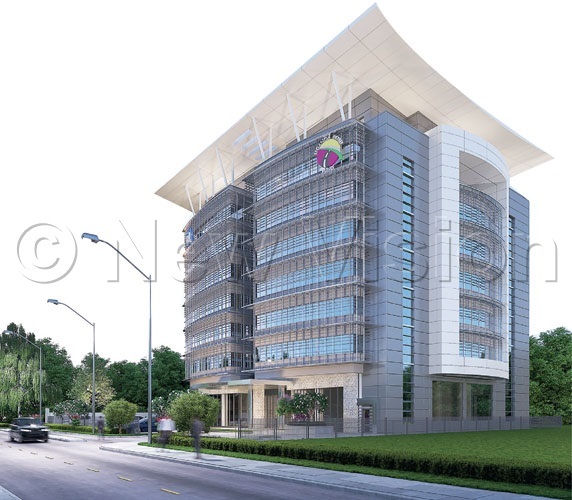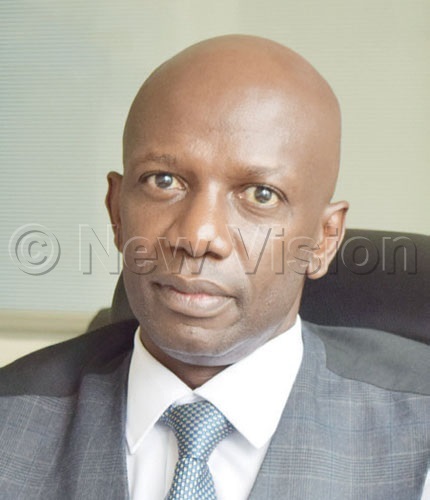Road Fund key to economic development
Oct 21, 2020
As part of the overall transport sector reforms, URF was established by an Act of Parliament of 2008 to finance routine and periodic maintenance of public roads from mainly Road User Charges

UGANDA ROAD FUND
It is one year since Dr Eng. Andrew Naimanye was appointed by the finance minister as acting Executive Director / Board Secretary of Uganda Road Fund (URF).
Dr Naimanye is also the Accounting Officer of Road Fund, which he joined at its commencement in January 2010. He spoke to New Vision about his work.
Q: What is the role of Uganda Road Fund in the transport sector?
A: The Road Fund is the main financier of all our road maintenance programmes for all public roads in the country. We review, analyse and finance road maintenance schemes of the Uganda National Roads Authority (UNRA), Kampala Capital City Authority (KCCA), cities, districts, municipalities, town councils and sub counties. We follow up with the aforementioned agencies to ensure that road maintenance funds are used judiciously by undertaking physical and financial accountability assessments. The impact of the Road Fund is felt by all road users.
As part of the overall transport sector reforms, URF was established by an Act of Parliament of 2008, to finance routine and periodic maintenance of public roads from mainly Road User Charges (RUCs).
URF became operational in January 2010 and undertakes a spectrum of roles that are critical in the delivery of the third National Development Plan (NDPIII) and contributes enormously to the economy of Uganda.
The Fund also provides oversight over road maintenance resources seeing to it that timely, adequate and reliable funding is deployed to protect the road asset.
It is the central point for developing and coordinating the entire country's road maintenance programmes, ensuring accountable use of these resources to the expectation of road users.
The Road Fund provides signals to policy makers on the due needs of the network and flow of policy directives to implementing agencies. It is the sole avenue for building the reform principle of commercialisation of management of Uganda's road asset. It administratively reports to the finance ministry.
However, operationally, the Road Fund reports to the works ministry.
The board that manages the fund comprises of representatives from the finance ministry, local government ministry, the works ministry, freight transporters, passenger transporters, accountants and engineers.
Implementation of road maintenance works is handled in accordance with performance agreements signed between URF and the 177 implementing agencies comprising of the Uganda National Roads Authority (UNRA) for national roads (20,854km); KCCA for 2,103km of city roads; 134 district local governments for district roads (34,381 km), town council roads (9,530 km) and community access roads (68,933km); and urban roads in seven new cities and 34 municipal councils for municipal roads (3,198 km).
The current budget of the Road Fund in the current financial year is sh512b compared to sh112b when operations commenced in the financial year 2009/2010, which translates into a growth of 360% over the last 10 years. However, the current budget only covers about 40% of all the requirements.
The road financing requirements of our implementing agencies are in the order of sh1.2 trillion annually, in order to protect and preserve our existing road network, whose replacement cost value is about sh30 trillion.
What has UFF achieved over the last 11 years?
The Fund has unequivocally established a firm space in the transport sector as the leading financier of road maintenance and accountability centre.
There is clarity in the process of road maintenance programming, financing and accountability. Professional and accountable internal processes are in place and we have ably disbursed and accounted for sh3.5 trillion road maintenance financing over the last 11 years. A scientifically derived resource allocation formula is in place, as well as a long term five-year plan. The Road Fund is also an active member of the Africa Road Maintenance Funds Association (ARMFA) that groups over 32 Road Funds in Africa.

MORE ACHIEVEMENTS
-
Disbursement and accountability of sh3.5 trillion appropriated by Parliament to implementing agencies since January 2010 to date for maintenance of 138,716km of public roads, and UNRA's operational expenses.
-
Established a framework for generation, collection, and management of RUCs.
-
Conducted monitoring and evaluation, and technical and financial audits of funded road maintenance programmes in the designated agencies on a sampling basis.
-
The Road Fund was the first entity to undertake real time technical and financial reviews in the implementing agencies.
-
Embedded the culture of budgetary discipline in Road Fund implementing agencies and recovered over sh2b through audits of implementing agencies
-
Provided funding and oversight for Force Account equipment maintenance in the implementing agencies. The plant and equipment of Road Fund implementing agencies is at over $500m.
-
Engaged political leaders in the management of local roads through committees.
-
Developed a new 12-storey office complex jointly with PPDA on Plot 39 Nakasero Road, which will cost sh54b, and is due to open in May next year.

-
Established the URF five-year strategic and corporate plan 2020/21 to 2024/25, which is aligned to NDP III.
-
Developed the five-year road maintenance financing plans. The plan annually requires sh1.2 trillion to maintain various categories of roads and specifically to improve the condition of public roads in fair to good condition from 60% to 85% over the next five years to 2024/25.
-
Prepared URF Regulations, including operationalisation of the District Road Committees.
-
Prepared, published, and disseminated the URF annual reports and one-year road maintenance and expenditure plans. The reports have demonstrated progressive improvement in road condition.
SYSTEMS DEVELOPMENT
- Developed a Road Maintenance Management and Monitoring System (RMMS): This is a web-based system for planning and reporting on road maintenance programmes of URF and its implementing agencies.
-
Developed and calibrated a new funds allocation formula that uses equitable and objective criteria, including traffic volume, traffic loading, asset value, road length and climatic conditions.
-
Developed a unit cost framework that URF uses to develop realistic unit costs to guide implementing agencies.
STUDIES, TECHNICAL ASSISTANCE AND STAFF SKILLS ENHANCEMENT
-
Undertook studies into use of alternative technologies in low cost seals and rigid pavements.
-
Improved the technical capacity of implementing agencies through tailored trainings and workshops.
-
Secured funding of euros 2.8m for capacity building through the European Union.
What strategies have been deployed during the COVID-19 period to ensure that roads remain motorable all year round?
Funding of roads has continued unaffected even during the pandemic and we thank the finance ministry for the continued prioritisation of road maintenance financing.
Most implementing agencies, including UNRA and KCCA, took advantage of the reduction in traffic during the lockdown to undertake major works uninterrupted.
Could you tell us your plan for financing road maintenance in the newly created cities, what are the underlying implications?
A special budget line in FY2021/22 has been created for the new cities to increase their maintenance funding. The cities will be allowed to undertake work, both by contracts and force account, just like KCCA.

What has been your experience working with over 170 designating agencies, including the biggest consumers of the URF budget that include UNRA, KCCA and others in the COVID-19 period? What has been the absorption rate of road maintenance funds?
In 2010, we had only 80 designated agencies and the number has now significantly increased to 177; however, we have adjusted and are able to adequately handle all the demands of the agencies as practically as possible. Absorption of road maintenance funds is no longer a challenge as agencies plan early enough in the process; and we have improved oversight of our implementing agencies.
You recently advertised for an Executive Director (ED). How far are you with the process?
That is a matter for the URF board and a known unknown. The ED's role is very critical in the preservation of our existing sh30 trillion-road network, and economic transformation of Uganda.
I left employment in the UK and returned to serve Uganda in 2010 as part of the management team that established the Fund, following a meritorious recruitment process undertaken by development partners (European Union and DANIDA).
URF has been very successful and I hope to continue diligently serving Uganda and specifically URF as I have professionally done for the last 11 years while reporting to the Board and the appointing authority.
We need to build on the successes so far achieved. The condition of our road network for all road categories has tremendously improved and that is testament to the hard work of the Board, staff and management of the Road Fund.
